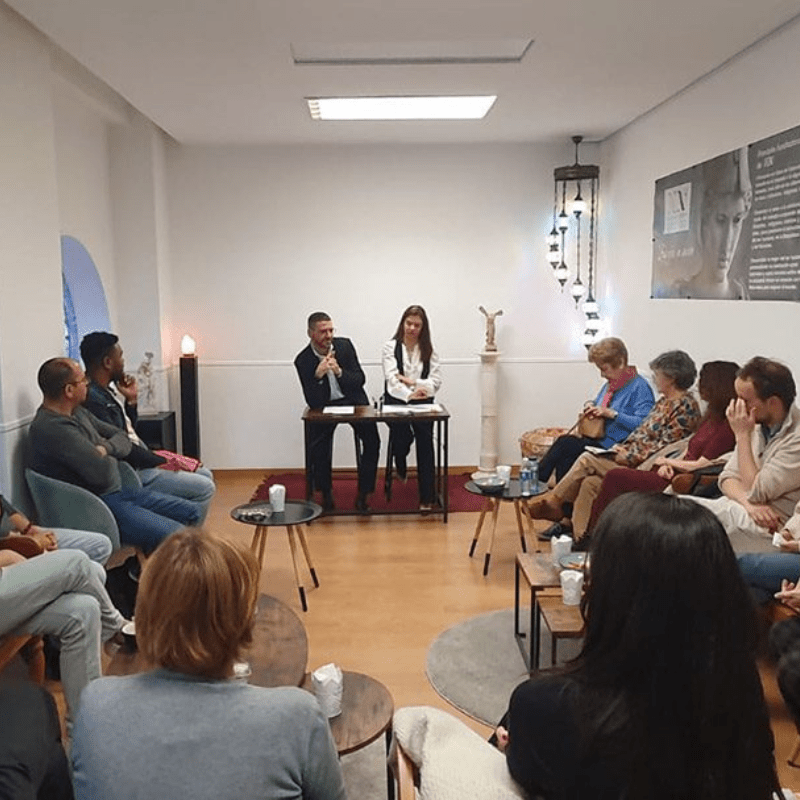COURSE
PHILOSOPHY
FOR LIVING
From theory to practice:
Philosophy for everyday life
Philosophy course for living
This course in practical philosophy brings together the thinking of the most prominent philosophers from the East and West, especially those who have left profound marks on the path of humanity.
The comparative study of philosophies does not belong to a single thinker or to a particular school; it is a legacy of humanity.
We seek to promote a philosophy for a human being who builds himself, for a builder of himself.
The practical experience of philosophy makes us more authentic, more self-confident, and happier.
This course aims to transform your perspective on life. If you’d like to try what we offer, please sign up using the attached form.

This course will help you:
- Deepen your understanding of the human being
- Harmonize thought, feeling, and action
- Recognize and enhance your own strengths
- Activate universal values
- Find meaning and purpose in life
- Transform yourself and your environment
- Build a future of coexistence
Training Program
Discover the detailed syllabus for the three course modules.
This course explores the essential approaches and most significant knowledge of civilizations, both Eastern and Western, regarding human nature, the universe, life, society, and more.
Module I: The Human Being and Himself: Understanding and Developing Ethics and Values
1. Natural Philosophy and the Enigma of Life
– The Human Being Facing Life’s Questions
– Harmony Between Mind and Heart
– Foundations for Universal Ethics. Concept of Ethics and Morals
– Observing the Order and Harmony of the Cosmos: Evolution
– Visible and Invisible Worlds
– Planes and Dimensions of the Universe
2. The Human Being and His Nature
– Microcosm and Macrocosm
– Subtle Dimensions of Man: Other Inner Realities
– Self-Knowledge and the Construction of One’s Own Personal Reality
3. The Wisdom of India
– Mystical-Esoteric Poem from the Bhagavad Gita: The Awakening of Consciousness and the Inner Battle
– The Human Being Facing Destiny: The Concept of Dharma and Karma
– Facing Death and the Afterlife: The Theory of Reincarnation
4. The Mysteries of Tibet
– Ancient Tibetan Texts: “The Voice of the Silence,” “The Book of the Golden Precepts”
– An Approach to Helena Petrovna Blavatsky
– Traditions Concerning the Masters of Wisdom
– Discipleship Systems in Antiquity and Their Role in the Development of Human Qualities
5. Buddhist Philosophy
– The Life and Teachings of the Buddha. The Dhammapada
– The Human Being Facing Suffering and Pain
– Serenity of Mind and Inner Peace
– Projecting Our Thought into the Invisible World. The Power of a Positive Mind
6. The Far East. China
– Confucius
– Life and Thought
– Ethics and Politics: Ethics as the Foundation of Social Order
– The Qualities of a Good Leader and the Pillars of Lasting Peace
Module II. The Social Dimension of the Human Being. To Improve Our Relationships and Coexistence
7. The Challenge of Living in Society
– The Problems of Human Beings and the World Today. Dehumanization and Loss of Purpose
– The Need to Create a Consciousness of Universal Brotherhood
– Confucius and Plato: A Better World Is Only Possible with a Better Man
– The Role of Youth in Times of Change. The Need for Heroism
8. Plato and the Myth of the Cave
– The Platonic Ideal of Man and the World: the Just, the Good, the Beautiful, and the True
– Plato’s Conception of the Individual
– Symbolism of the Myth of the Cave: Freedom and Knowledge
– Morality as the Foundation of Social Rights and Political Duty
9. Aristotle. The Pursuit of Happiness
– The Pursuit of Happiness
– The Degrees of Knowledge
– Virtue: The Development of the Soul’s Excellences
10. Plotinus. The Neoplatonists and Eclecticism
– Plotinus and the Eclectic School of Alexandria
– The Three Paths to Wisdom: Beauty, Music, and Philosophy
– Theory of the Imprisoned Soul
– Art as a Path to Realization
11. The Importance of Education
– Education and Comprehensive Human Formation
– Education, Citizenship, and Coexistence
– Pedagogical Principles of Coexistence
12. Egypt
– The Initiatory Mysteries in the Ethical Realization of the Individual
– Science, Art, and Magic in Egypt
– Texts and Teachings of the Early Dynasties
13. Rome and the Stoics
– Stoic Philosophy: Epictetus, Marcus Aurelius, Seneca
– Courage and Fortitude in the Face of Adversity
– Self-Power: Will, Love, Intelligence
– Inner Freedom and the Art of Decision-Making
Module III. The Human Being and History: Building the Future
14. Philosophy of History
– Philosophy and Logic of History
– The Theory of Eternal Return and Historical Cycles
– The Master Story of Life
15. The Importance of Transmission
– Transmission and the Need for Objectivity
– Methods of Presenting History
– Critique of Historical Knowledge
16. History and Mythology
– The Meaning of History and Mythology
– Properties of Symbols
– Universal Myths and Symbols. The Myth of the Universal Flood, the Myth of the Labyrinth…
17. Cycles of History
– Historical Rhythms
– Yugas and Cycles in History
– Theory of Eternal Return
18. Freedom and Destiny
– Cicero’s Historical Theories and the Platonic Logos
– Humanity Facing Destiny: Determinism or Freedom?
– The Crisis of Our Time and Its Projection into the Future of New Forms of Civilization
– How to Transform Oneself into a Conscious Agent of History
Appendix I. Practical Exercises
Throughout the course, useful exercises are proposed for the development of our natural faculties, such as attention, concentration, memory, imagination, control of affective processes, willpower, etc., drawn from the traditions and topics covered during the course.

Philosophy course for living
A DIFFERENT PHILOSOPHY PROPOSAL
